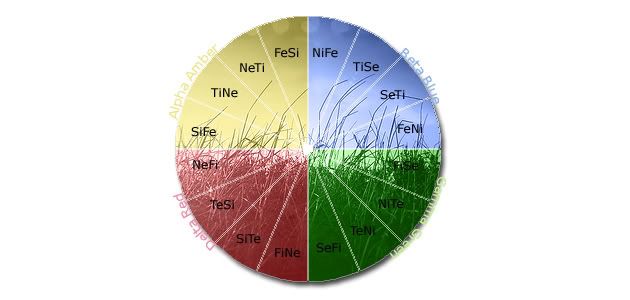
Socionics Study Blogspot
Updates
* 6/04/08 Myers-Briggs Conversions
* 6/04/08 Career Satisfaction Descriptions
for SiFe, TiNe, NeTi, FeSi
* 6/04/08 PersonalityPage Descriptions
for FeSi, SeFi, FeNi
* 5/28/08 The Quadras
* 5/25/08 Intertype Relations
* 5/24/08 Youtube Examples for TiNe,
FeSi, FeNi, NiTe, TeNi, NeFi
* 5/21/08 All type Examples added except
for NiFe & TeSi
Origins Updates
* 6/04/08 Myers-Briggs Conversions
* 6/04/08 Career Satisfaction Descriptions
for SiFe, TiNe, NeTi, FeSi
* 6/04/08 PersonalityPage Descriptions
for FeSi, SeFi, FeNi
* 5/28/08 The Quadras
* 5/25/08 Intertype Relations
* 5/24/08 Youtube Examples for TiNe,
FeSi, FeNi, NiTe, TeNi, NeFi
* 5/21/08 All type Examples added except
for NiFe & TeSi
Socionics is based on Carl Jung's work on Psychological Types, Freud's theory of the conscious and subconscious mind, and Antoni Kępiński's theory of information metabolism. The theory was developed in the 1970s and 80s mainly by the Lithuanian researcher Ausra Augusta (Aušra Augustinavičiūtė), a financier and teacher of political economics. The name socionics is derived from the word "society", since Augusta believed that each personality type has a distinct purpose in society, which can be described and explained by socionics. (Wikipedia.org)
Types
There are 16 types of personalities, each defined by a unique combination of two "Ego" functions, which refer to areas of reality the individual is instinctually aware of and values. Although each of the functions are active within you, two functions will be your dominant method of observing, analyzing, and interacting with the world, and all other functions will be filtered through them.
The Ego functional makeup of the 16 types, which are commonly divided into four "quadras," include:
| Alpha Quadra SiFe: Sensing Ethical Introvert TiNe: Logical Intuitive Introvert NeTi: Intuitive Logical Extrovert FeSi: Ethical Sensing Extrovert | Beta Quadra NiFe: Intuitive Ethical Introvert TiSe: Logical Sensing Introvert SeTi: Sensing Logical Extrovert FeNi: Ethical Intuitive Extrovert |
| Delta Quadra FiNe: Ethical Intuitive Introvert SiTe: Sensing Logical Introvert TeSi: Logical Sensing Extrovert NeFi: Intuitive Ethical Extrovert | Gamma Quadra FiSe: Ethical Sensing Introvert NiTe: Intuitive Logical Introvert TeNi: Logical Intuitive Extrovert SeFi: Sensing Ethical Extrovert |
Intertype Relations
Socionics also includes the study of each types' relation to the other, which come out most noticeably when there is close psychological distance involved, such as with a sibling, parent, roommate, or spouse. These 16 relationships include:
- Identity: identical understanding and value.
- Duality: ideally complementing understanding and value.
- Activity: spur activity.
- Mirror: similar interests and ideas, but pay attention to different sides of the coin.
- Similarity: similar interests, but value completely different sides of the issue.
- Semi-Duality: complementing understanding but different values.
- Benefit: a Beneficiary takes interest in and tries to change a Benefactor, as long as he has that 'something special' that only he can provide her.
- Super-ego: mutual respect, but little shared common interests.
- Contrary: unstable psychological distance; when left together usually compete over strong sides, possibly trying to capture attention of listeners.
- Quasi-identity: understanding needs to be filtered, tend to think in different ways, but do tend not to attack eachother's weaknesses.
- Conflict: tend to directly attack eachother's weaknesses in argument, different levels of confidence.
- Supervision: a Supervisor sees a Supervisee as interesting and capable, but in need of his help and advice; however the Supervisee does not understand what the Supervisor wants, which may irritate the Supervisor. The Supervisee wants to gain recognition from the Supervisor, but her abilities seem to be undervalued.
- Look-a-Like: good understanding and cooperation, but differing levels of confidence.
- Illusionary: relaxed interesting relations culminate in lack of effort towards achieving goals.
I suggest that you type yourself by your Ego function makeup. Read about the qualities of each type from a good Socionics resource. Thoughts about qualities like introversion or extroversion, other functions, quadras, clubs, and intertype relations can be considered second.
Essential Concepts
These will be discussed at length in the section on Structure and Functions.


3 comments:
I understand that the main subject of the course is Psychology? or I misunderstood?..
לימודי תואר שני בחו"ל
I appreciate your work. Keep up the work
CA in Lahore
CA Pakistan
Best CA in Pakistan
ACCA Pakistan
CA Subjects
Best faculty for CA
Post a Comment